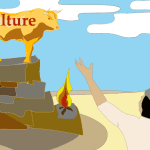?Then Elijah said to them, ?Seize the prophets of Baal; do not let one of them escape.?ESo they seized them; and Elijah brought them down to the brook Kishon, and slew them there. Now Elijah said to Ahab, ?Go up, eat and drink; for there is the sound of a roar of a heavy shower.?ESo Ahab went up to eat and drink.?E
One imagines that Ahab did not feel much like eating. He had gathered his 450 prophets of Baal for a great public contest with Elijah and Yahweh. He had watched through the whole morning as the prophets of Baal called on Baal to send fire from heaven. He had listened to Elijah?s mockery, and had seen the Baal-prophets?Eironic obedience to Elijah?s sarcastic commands. Through it all, Baal had given no answer: ?no voice, no answer, no attentiveness.?ETo top it off, Elijah has just ordered a wholesale slaughter of Ahab?s court prophets. It was enough to make anyone lose his appetite. But bow, with the corpses of the prophets turning the Kishon to blood, Elijah tells him to eat and drink at the top of Carmel. And Ahab, who has conformed to every command of Elijah, silently, grimly, complies. He ate and drank, but one imagines that he did not enjoy it.
But this eating and drinking is necessary. It is not merely for refreshment. It is part of the covenant-renewal that is taking place at Carmel. All the elements of a covenant renewal are there: Elijah the prophet leads the people, as Moses did at Sinai; the Lord demonstrates His power and glory, as He did at Sinai; the people acknowledge Yahweh as God and Lord, as they did at Sinai; and Ahab goes up to eat and drink, as Moses and the elders of Israel did at Sinai. Ahab?s meal is part of his renewal of the covenant. It is a sign of repentance, a sign that he is turning his back on the worship of Baal and the leadership of Baal?s prophets. It?s a sign that he is beginning to take his orders from Elijah instead. And so it is for us. Each time we come to this table, we are declaring by our actions that we are engaged to be the Lord?s people, to serve Him, to renounce the world, flesh, and the devil, that we are committed to conforming our lives to the Word of the Lord.
There is another dimension to this as well. In Scripture, eating and drinking is always associated with joy. ?Eat, drink, and rejoice before Yahweh your God?Eis a refrain in the passages of Deuteronomy that talk about Israel?s annual feasts. Yet, Ahab finds himself in a situation where eating and drinking and rejoicing seems inappropriate, callous, impossible. And it may often seem equally callous for us to eat, drink and rejoice here in the light of the atrocities that surround us. How can we eat, drink, and rejoice before the Lord in a world where thousands are still suffering the effects of a tsunami? How can we eat, drink, and rejoice when thousands of Africans are dying of AIDS? How can we eat, drink, and rejoice in the midst of a world of pain, suffering, hopelessness, sin and death? Where is our sympathy? Where is our compassion?
We cannot understand fully the purpose and character of this meal unless we see it in this context. We cannot see what we are up to until we see that we, like Ahab, are eating and drinking on the mountain while heaps of corpses bleed in the valley below. God has called us to this feast in the midst of a world of sin and death, a world of horrors. But He does not call us to this feast so that we can ignore those horrors. This meal shows us that God?s compassion is not merely the compassion of a fellow-sufferer, the compassion of mere sympathy, which is often paralyzed. God doesn?t enter into the world of sin and death merely to ?suffer alongside?Eus. God?s compassion is a triumphant compassion. He calls us to this feast because this feast is the feast of the kingdom, a visible sign of the kingdom of peace in the midst of a world of war. He calls us to this feast now, while horrors still surround us, because in Christ He has already triumphed, and will triumph over those horrors.















